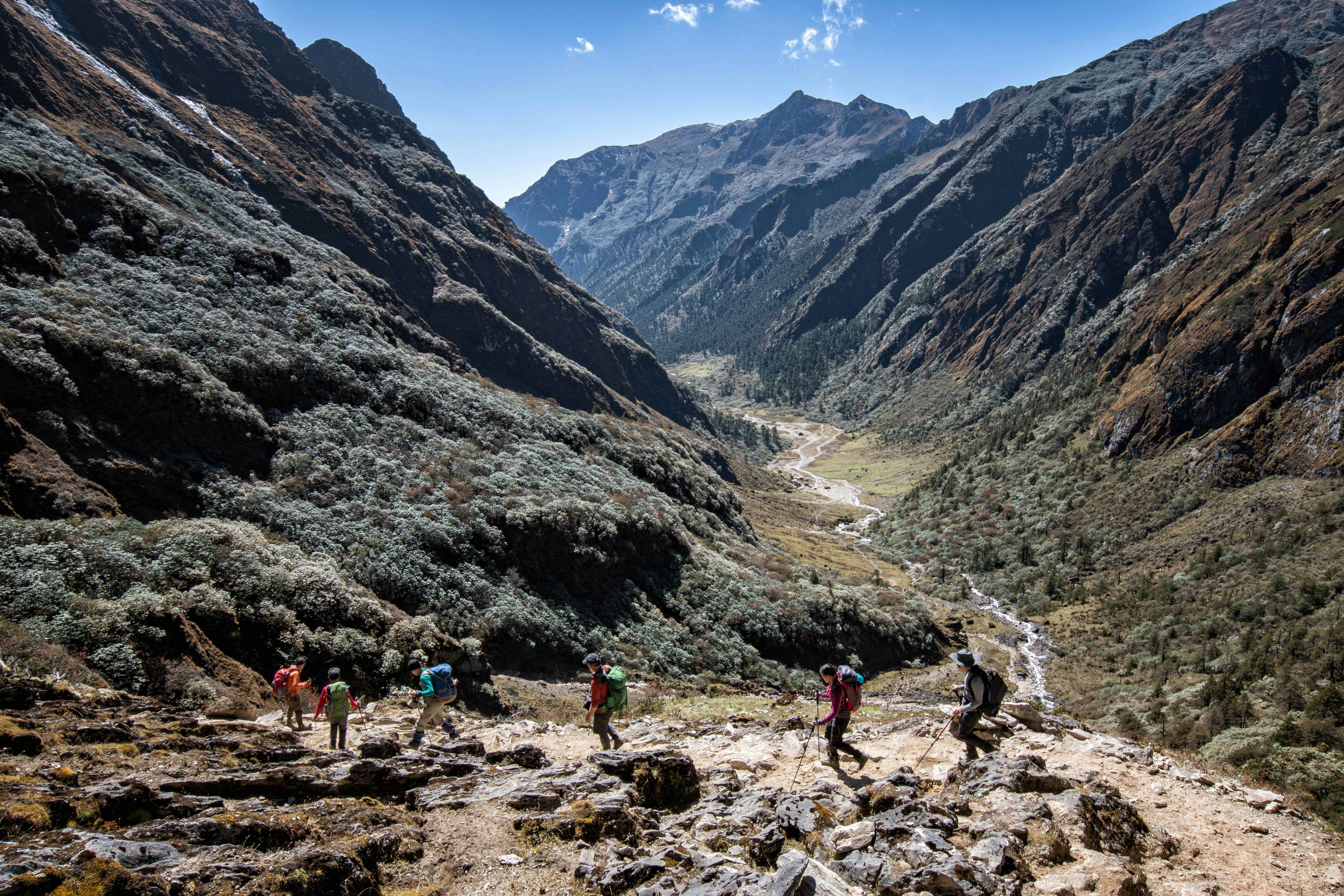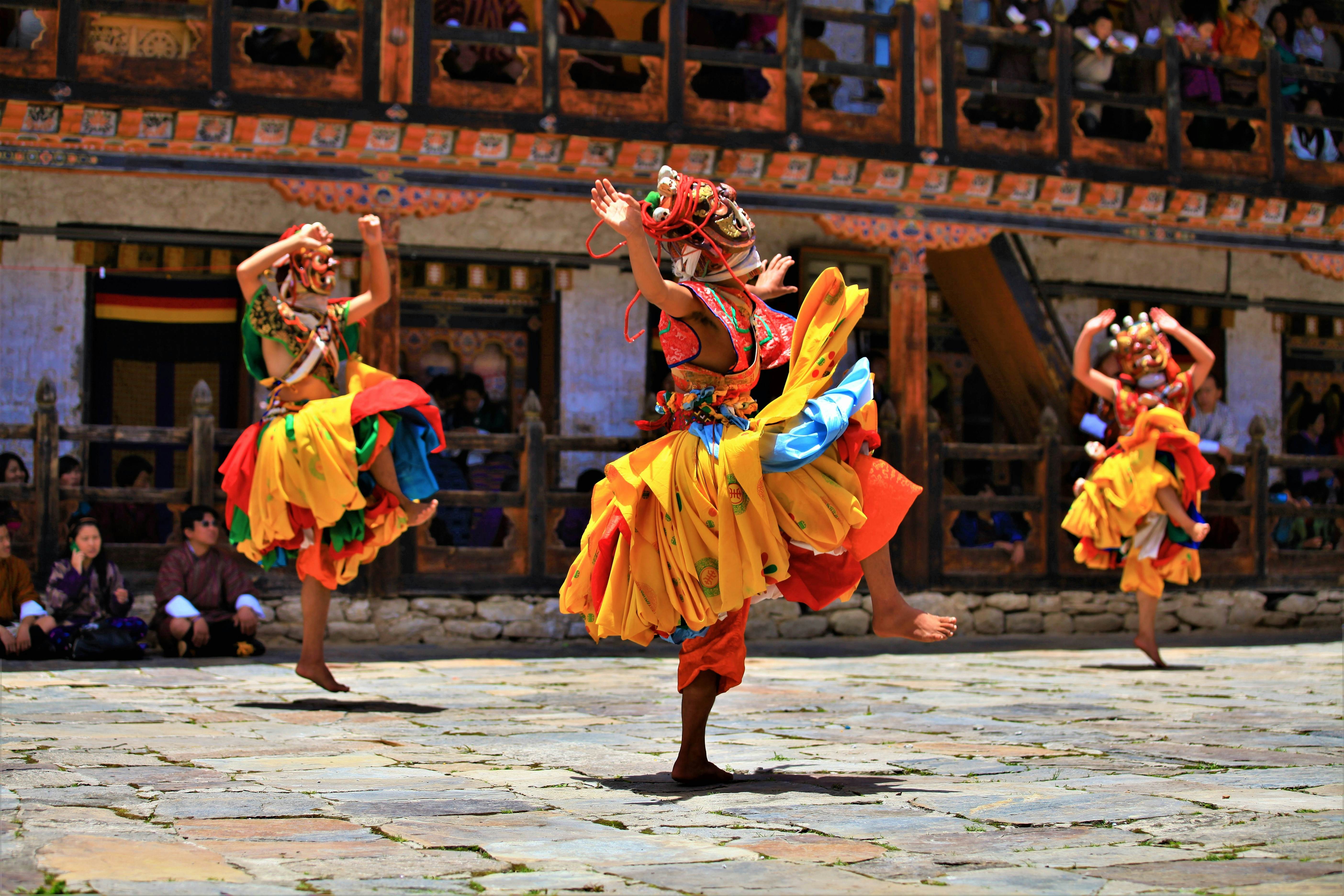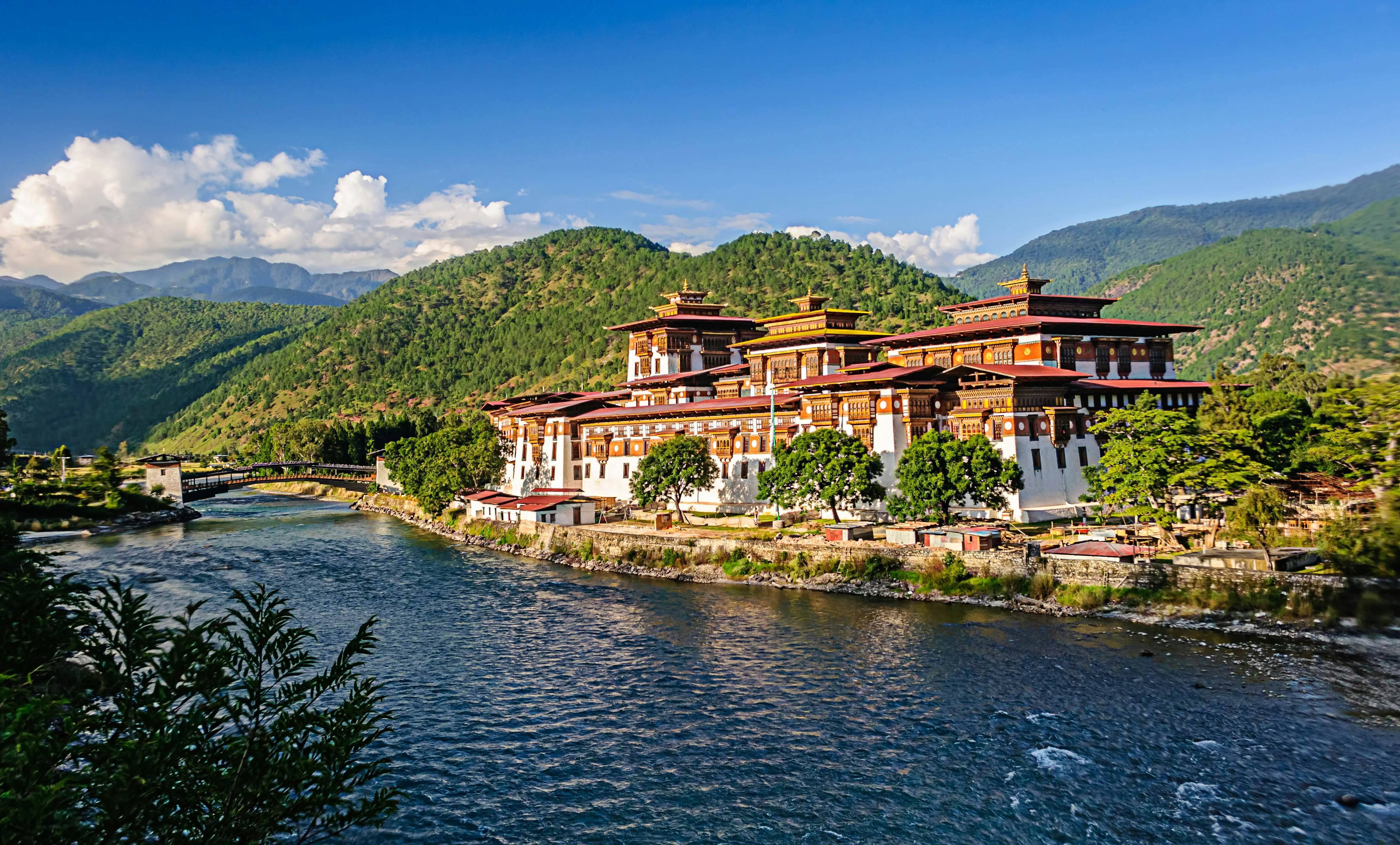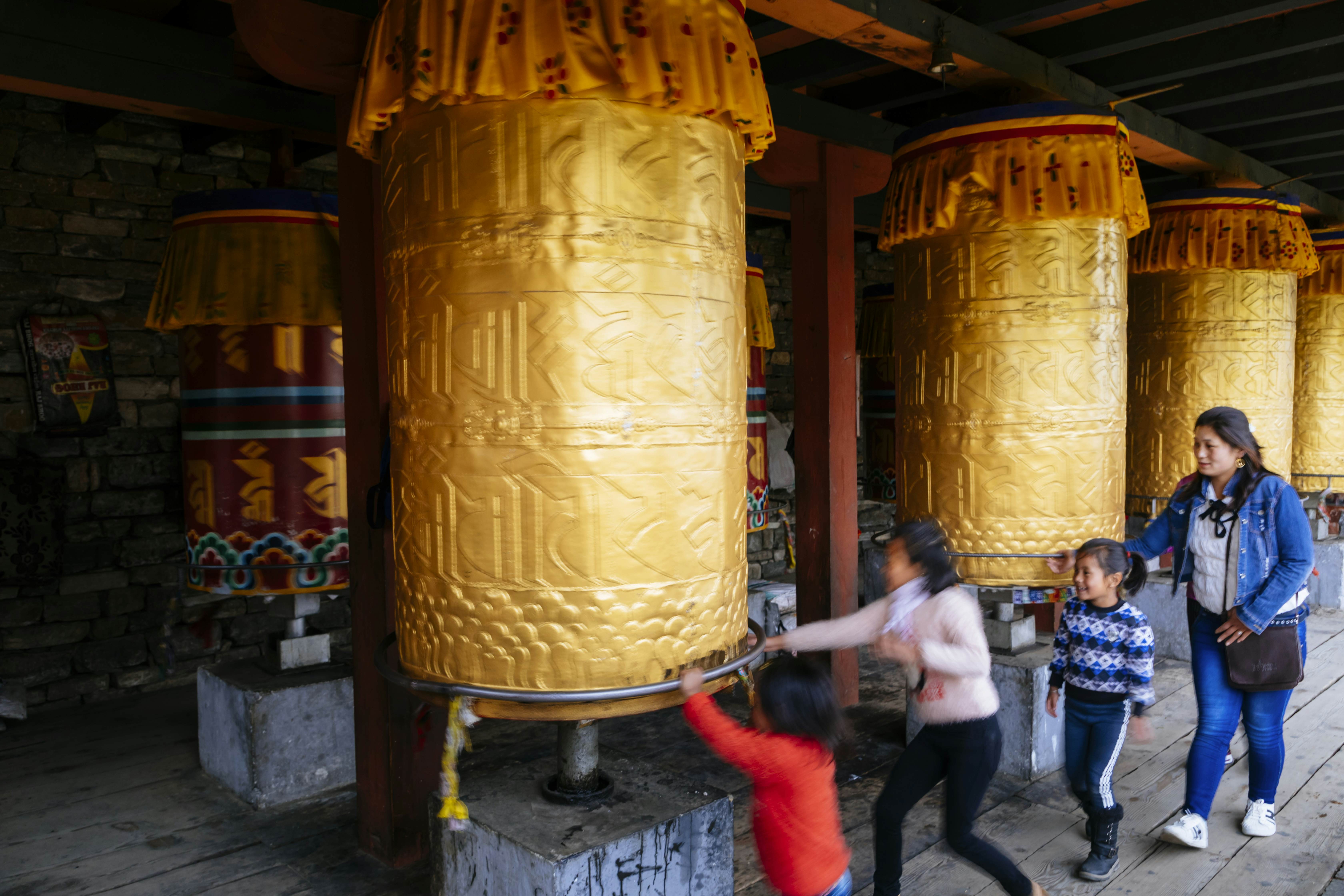Bhutan tourism offers a unique blend of cultural immersion and natural beauty. SIXT.VN can help you navigate this enchanting kingdom with ease, providing expert travel advice and seamless booking services. Discover Bhutan’s hidden gems and create unforgettable memories with our tailored travel solutions.
1. Is Independent Travel Possible in Bhutan?
Yes, independent travel is possible but using a tour operator is still recommended. Bhutan has reduced its Sustainable Development Fee (SDF) to US$100 per night, valid until August 2027, and no longer requires travelers to book all-inclusive tour packages. This allows adventurous travelers to book accommodations, guides, and transportation independently.
 Trekers following a trail through a mountainous region
Trekers following a trail through a mountainous region
While independent travel is possible, using a tour operator for activities like trekking, festivals, or specialized interests such as birding or cycling can enhance the overall experience. According to the official Bhutan Travel website, lists of certified tour operators, guides, and accommodations, including hotels and homestays, are available. SIXT.VN ensures you have access to reliable services, making your trip to Bhutan stress-free and enjoyable.
2. Do I Need Travel Insurance for Bhutan?
Yes, travel insurance is highly recommended. Although proof of travel insurance is no longer required for a Bhutanese visa, it is advisable to have comprehensive travel insurance. This should cover any activities you plan to undertake during your visit.
Travel insurance provides a safety net for unforeseen events such as medical emergencies, trip cancellations, and lost luggage. According to a 2023 report by the World Tourism Organization, having travel insurance can significantly reduce the financial burden of unexpected events. SIXT.VN can assist you in finding the right travel insurance plan to ensure a worry-free trip.
3. When Is the Best Time to Visit Bhutan for Festivals and Trekking?
Book early for festivals and trekking to secure your spot. Locals believe Bhutan is wonderful year-round. Autumn and spring are popular for the famous tsechus (religious dance festivals) and the changing leaves or rhododendron blooms, respectively. Booking in advance is essential.
 Monks wearing brightly colored costumes dance in a festival
Monks wearing brightly colored costumes dance in a festival
Summer and winter offer fewer crowds and lesser-known festivals. However, multiday treks might be challenging due to muddy trails and chilly camping. According to Bhutan’s Department of Tourism, winter offers clear skies and perfect light for photography, making it an auspicious time to travel. SIXT.VN can help you plan your trip around the best times, ensuring you don’t miss out on key cultural events.
4. How Do I Get to Bhutan?
Only two airlines fly to Bhutan, namely Drukair and Bhutan Airlines. Paro International Airport’s challenging landing conditions require specially authorized pilots.
Direct flights connect Paro to destinations like Bangladesh (Dhaka), India (Bagdogra, Guwahati, Kolkata, and New Delhi), Nepal (Kathmandu), Singapore, Thailand (Bangkok), and the UAE (Sharjah). Kathmandu offers an epic route with glimpses of Mt. Everest on clear days. Luggage cannot be checked through to the final destination, so claiming it before boarding the Bhutan connection is necessary. You can also reach Bhutan overland via India. SIXT.VN offers convenient flight booking services to help you find the best routes and fares.
5. Is Bhutan Environmentally Sustainable?
Yes, Bhutan is the world’s first carbon-negative country. Roughly the same size as Switzerland but with only 10% of its population, Bhutan maintains a constitutional mandate requiring a minimum of 60% forest coverage at all times.
 A riverside fortress surrounded by woodland
A riverside fortress surrounded by woodland
Plastic has been banned since 1999. According to the Gross National Happiness (GNH) philosophy, environmental conservation is a key pillar. Signs along the way remind you to keep the environment clean. SIXT.VN supports sustainable tourism practices, helping you explore Bhutan responsibly.
6. How Safe Is Bhutan for Travelers?
Bhutan is exceptionally safe with a low crime rate. Violent crime is scarce. Solo female travelers can feel secure, often under the watchful eye of guides or local friends.
The increase in female guides adds to the sense of security for solo women travelers. According to the 2023 Global Peace Index, Bhutan ranks as one of the safest countries in the world. SIXT.VN ensures your safety by providing reliable and trustworthy travel services.
7. What Vaccinations Do I Need for Bhutan?
No vaccines are required for entry into Bhutan, but staying up-to-date with routine vaccinations is important. Consulting a healthcare professional eight weeks before departure is recommended.
Standard recommendations include vaccinations for hepatitis A and B, diphtheria, tetanus, and typhoid, as well as childhood vaccinations for measles-mumps-rubella and polio. Longer trips may warrant vaccinations for Japanese encephalitis and rabies. According to the Centers for Disease Control and Prevention (CDC), being prepared with the necessary vaccinations ensures a healthy trip. SIXT.VN advises travelers to prioritize their health by consulting with healthcare providers.
8. How Can I Minimize Altitude Sickness in Bhutan?
Minimize altitude sickness by taking time to adjust. Acute Mountain Sickness (AMS) can occur above 2500m. Thimphu and Paro are just below this, but treks in the Himalayas reach 5000m, making AMS a risk.
Ascending slowly, taking rest days, and stopping if you feel ill are essential. If symptoms don’t ease, descend immediately. Acclimatization may be necessary before embarking on the Tiger’s Nest Monastery trek. According to the World Health Organization (WHO), gradual acclimatization is the best way to prevent AMS. SIXT.VN helps you plan your itinerary to include acclimatization days, ensuring a safer and more enjoyable experience.
9. What Medical Essentials Should I Pack for Bhutan?
Pack essential medical supplies to ensure your well-being during your trip. Insect repellent is crucial for protection against mosquito-borne illnesses in summer and southern regions.
Due to climate change, Bhutan had its first dengue epidemic in 2019. Sunscreen and glasses are important due to the strong sun. Dramamine for car sickness and Diamox for altitude sickness are also recommended. Diapers or tampons should be brought along. According to the U.S. Department of State, being prepared with necessary medical supplies is crucial for a comfortable trip. SIXT.VN reminds travelers to pack their medical essentials for a safe journey.
10. What Kind of Healthcare Is Available in Bhutan?
Health care in Bhutan includes traditional remedies and Western medicine. Thimphu’s National Institute of Traditional Medicine offers ayurvedic medicine crafted from local plants at no cost.
Alternatively, hospitals and health clinics provide Western medicine. The Jigme Dorji Wangchuck National Referral Hospital in Thimphu is the largest in Bhutan. According to Bhutan’s Ministry of Health, both traditional and modern healthcare options are available to visitors. SIXT.VN ensures you have access to information about healthcare facilities, promoting a worry-free trip.
11. What Is Bhutanese Food Like?
Bhutanese food is spicy and delicious. Local cuisine emphasizes fresh, seasonal ingredients. Dishes like ema datse (chilies with cheese) and kewa datse (potatoes, chilies, and cheese) define Bhutanese cuisine, but can be modified according to your taste.
 A top-down view of pan of chilies and cheese, or ema datse, the national dish of Bhutan
A top-down view of pan of chilies and cheese, or ema datse, the national dish of Bhutan
Asking your tour operator or guide for recommendations is key. While some dishes can be quite spicy, antacids may be needed. According to Tourism Bhutan, exploring local cuisine is an integral part of the cultural experience. SIXT.VN provides recommendations for authentic dining experiences, enhancing your cultural immersion.
12. Is the Tap Water Safe to Drink in Bhutan?
No, tap water isn’t safe to drink in Bhutan unless it has been boiled or purified. Request boiled water from your hotel or guesthouse, or purchase bottled water.
However, local whiskey and lager are safe to drink, and Bhutan has a flourishing craft-beer scene. According to the Centers for Disease Control and Prevention (CDC), drinking purified water is crucial for preventing waterborne diseases. SIXT.VN advises travelers to stay hydrated with safe drinking water.
13. What Is the Local Etiquette in Bhutan?
Follow local etiquette to show respect for Bhutanese culture. “Kuzu zangpo la” means “hello” in Dzongkha, the national language. Recite this while bowing. English is widely spoken in schools.
It is common to hear the word “la” at the end of a sentence or question as a sign of respect. If invited into someone’s home and offered food, say the words “meshu meshu” while covering your mouth with your hands. According to the Bhutan Cultural Atlas, understanding and respecting local customs enhances the travel experience. SIXT.VN provides insights into local etiquette, helping you navigate cultural interactions with ease.
14. Is Tipping Customary in Bhutan?
Tipping is appreciated but not mandatory. Show appreciation to your guide and driver by tipping them at the end of the trip. Extend this gesture to the crew on a trek.
While 10–15% is normal, the amount and currency are up to you. Tipping is not necessary at restaurants and hotels, as a 10% service charge is added to the bill. According to travel experts, tipping is a considerate way to acknowledge good service. SIXT.VN provides guidance on tipping customs, ensuring you show appropriate gratitude.
15. Where Can I Experience Nightlife in Bhutan?
Head to Thimphu for Bhutan’s nightlife. While Bhutan is known for serene landscapes and monasteries, Thimphu offers a buzzing nightlife and music scene.
Chang Lam near the stadium features options like the Zone, Mojo Park, the Grey Area, Space 34, and Vivacity. According to local guides, Thimphu’s nightlife offers a unique perspective on Bhutanese culture. SIXT.VN can provide recommendations and transportation options for experiencing Thimphu’s nightlife safely.
16. Is Smoking Allowed in Bhutan?
Smoking is legal in Bhutan, but it must be done discreetly. While Bhutan was known for its strict anti-smoking laws, the law was reversed in 2021.
Smoking must be done “out of sight,” behind buildings. The same goes for vaping. Despite cannabis growing prolifically, it remains illegal, with possession leading to jail time. According to Bhutan’s health regulations, respecting smoking guidelines is essential. SIXT.VN reminds travelers to adhere to local laws and regulations.
17. What Should I Know About Local Beliefs in Bhutan?
Keep an open mind about local beliefs. Folktales, myths, and legends are an integral part of Bhutan’s culture and national pride.
Whether it’s migoi (yeti) sightings or the significance of phalluses as symbols of protection, approach Bhutan with an open mind. Travelers may find it challenging to suspend logic, but be kind and set aside preconceptions. According to cultural anthropologists, understanding local beliefs enhances cultural immersion. SIXT.VN encourages travelers to embrace and respect Bhutanese culture.
18. What Should I Pack for a Trip to Bhutan?
Pack layers, modest clothes, and good boots for varying temperatures and terrains. Modest clothing is needed for entering temples and monasteries, including socks for cold floors.
Aside from hiking boots, bring a nicer shoe for wearing with a gho or kira (Bhutanese national dress). For inspiration, follow Bhutan Street Fashion on Instagram. According to travel bloggers, packing appropriately ensures comfort and respect for local customs. SIXT.VN provides packing tips to help you prepare for your trip.
19. How Should I Handle Money in Bhutan?
Carry cash and download money apps for convenience. It’s easier to bring your own money in crisp bills rather than rely on ATM machines.
The official currency is the ngultrum, pegged 1:1 to the Indian rupee. Exchange at a bank or hotel for small notes. Most businesses accept cash or payments through goBoB or BNB MyPay apps. According to financial advisors, having a mix of cash and digital payment options is ideal. SIXT.VN provides information on currency exchange and payment methods.
20. How Can I Stay Connected in Bhutan?
Pick up a SIM card on arrival at Paro International Airport. You can also rent a pocket Wi-Fi device, useful for visiting remote regions.
SIM cards are now easily obtainable upon arrival. According to telecommunications experts, having a local SIM card ensures reliable connectivity. SIXT.VN helps you stay connected by providing information on SIM card availability and Wi-Fi options.
21. What Is the Etiquette at Religious Sites in Bhutan?
Understand the etiquette at religious sites. When visiting Buddhist monasteries, nunneries, and temples, observe proper etiquette.
Remove shoes and hats, wear clothing that covers shoulders and knees, and refrain from photography in altar rooms. Circumambulation of a Buddhist temple or shrine must always be clockwise. According to religious scholars, respecting religious customs is essential. SIXT.VN provides guidelines on religious etiquette, ensuring you show appropriate respect.
 A woman and three young children spinning a prayer wheel in a monastery
A woman and three young children spinning a prayer wheel in a monastery
22. Is Bargaining Acceptable in Bhutan?
Don’t bargain hard in Bhutan. Unlike some other places in Asia where haggling is expected, Bhutan’s market scene is more straightforward.
You typically pay the listed price, as aggressive negotiating tactics are uncommon. Be prepared to spend more on textiles crafted from natural fibers. Geometric yathras are a budget-friendly option. According to market analysts, understanding pricing norms is crucial for a smooth shopping experience. SIXT.VN provides insights into local market customs, helping you shop with confidence.
23. How Can I Stay Updated on Festival Dates in Bhutan?
Consult the lunar calendar to stay updated on festival dates. Since Bhutan follows the lunar calendar, dates for Buddhist festivals, like tsechus, change yearly.
However, some cultural festivals, like Bhutan National Day, follow the Gregorian calendar. According to cultural event organizers, checking the lunar calendar is essential for planning festival visits. SIXT.VN provides updated festival dates, helping you plan your trip around key cultural events.
FAQ About Tourism in Bhutan
1. What is the best way to get around in Bhutan?
The best way to get around Bhutan is by hiring a car with a driver, which can be arranged through SIXT.VN. This ensures you have a reliable and knowledgeable guide to navigate the mountainous terrain.
2. Can I use my credit card in Bhutan?
Credit cards are accepted in larger hotels and shops, but it’s advisable to carry cash, especially when visiting smaller towns and villages. SIXT.VN recommends exchanging currency upon arrival for convenience.
3. What are the visa requirements for Bhutan?
A visa is required for most nationalities to enter Bhutan. SIXT.VN can assist with the visa application process, ensuring you have all the necessary documents.
4. Are there any cultural sensitivities I should be aware of?
Yes, it’s important to dress modestly when visiting religious sites and to always walk clockwise around temples and prayer wheels. SIXT.VN provides detailed cultural guidelines to help you respect local customs.
5. What is the official language of Bhutan?
The official language of Bhutan is Dzongkha, but English is widely spoken, especially in tourist areas. SIXT.VN ensures you have access to English-speaking guides for a seamless travel experience.
6. How can I book accommodations in Bhutan?
Accommodations in Bhutan can be booked through SIXT.VN. We offer a range of options from luxury hotels to traditional guesthouses, ensuring you find the perfect place to stay.
7. What is the Sustainable Development Fee (SDF) and how does it work?
The SDF is a daily fee of US$100 per night for tourists, which goes towards funding Bhutan’s sustainable development projects. SIXT.VN includes the SDF in your tour package for hassle-free travel.
8. What is the Tiger’s Nest Monastery and how can I visit it?
The Tiger’s Nest Monastery, also known as Paro Taktsang, is a famous cliffside monastery. SIXT.VN organizes guided tours to the monastery, providing you with an unforgettable experience.
9. What is the best time to see the Black-Necked Cranes in Bhutan?
The best time to see the Black-Necked Cranes is from late October to mid-February when they migrate to the Phobjikha Valley. SIXT.VN offers tours during this period to witness this natural spectacle.
10. How can SIXT.VN help me plan my trip to Bhutan?
SIXT.VN offers comprehensive travel services including flight booking, accommodation, visa assistance, guided tours, and transportation, ensuring a seamless and memorable trip to Bhutan. Contact us at +84 986 244 358 or visit SIXT.VN to start planning your adventure. Address: 260 Cau Giay, Hanoi, Vietnam.
SIXT.VN: Your Trusted Partner for Exploring Bhutan
Planning a trip to Bhutan can be overwhelming, but with SIXT.VN, you can rest assured that every detail is taken care of. From visa assistance to customized tour packages, we provide comprehensive travel solutions tailored to your needs. Our services include:
- Expert Travel Advice: Get personalized recommendations and itineraries from our experienced travel consultants.
- Seamless Booking: Easily book flights, accommodations, and tours through our user-friendly platform.
- Reliable Transportation: Enjoy comfortable and safe transportation with our professional drivers.
- Cultural Immersion: Experience the best of Bhutanese culture with our knowledgeable guides.
- 24/7 Support: Receive round-the-clock assistance from our dedicated customer service team.
Don’t let the complexities of travel planning hold you back. Let SIXT.VN be your guide to discovering the magic of Bhutan. Visit our website at SIXT.VN or contact us at +84 986 244 358 to start planning your dream trip today.
Address: 260 Cau Giay, Hanoi, Vietnam.



